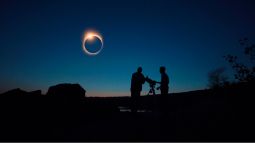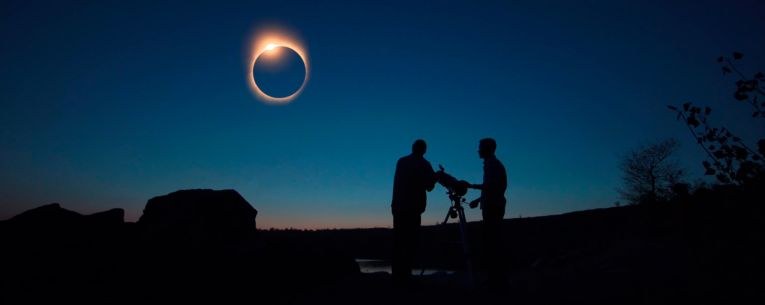“Before you die, you owe it to yourself to see a solar eclipse,” says David Baron, a science journalist who has spent 20 years traveling the world to chase solar eclipses.
Baron is an umbraphile, someone mesmerized by eclipses; the word literally means “shadow lover.” For Baron, eclipses are a majestic, almost spiritual, phenomenon that makes one ponder the universe.
“A solar eclipse is just an opportunity to stop for a moment and appreciate being alive on this planet, in this amazing solar system where there are all of these giant forces at work that, whether we are here or not, they will continue on,” Baron muses. “For me, it’s a way to get in touch, in a very visceral sense, with existence.”
If you can’t be within the path of “The Great North American Eclipse,” on April 8, you’ll have to wait another 21 years to catch the next total eclipse in the U.S. — an awfully long time to wait for a potentially life-changing experience.
Catch another eclipse sooner by going abroad. Around the globe, there are two to five solar eclipses annually, with a total eclipse taking place every 18 months or so. Check out our list of partial and total solar eclipses and lunar eclipses, or blood moons, to chase across the world.
Eclipses in 2024
Partial lunar eclipse Sept. 17-18
Regions seeing, at least, some parts of the eclipse: Europe, Much of Asia, Africa, North America, South America, Pacific, Atlantic, Indian Ocean, Arctic, Antarctica
Where to see it in major U.S. cities: Detroit, Michigan, San Francisco, Washington DC, Los Angeles, California, Chicago, New York
Where to view the eclipse abroad and more about its path.
Annular solar eclipse (creates a “ring of fire” effect). This eclipse will appear partial in many locations where visible Oct. 2, 2024:
Regions seeing, at least, a partial eclipse: South in North America, Much of South America, Pacific, Atlantic, Antarctica.
Where to view the eclipse and more about its path.
Eclipses in 2025
Total lunar eclipse March 13-14
Regions seeing, at least, some parts of the eclipse: Europe, Much of Asia, Much of Australia, Much of Africa, North America, South America, Pacific, Atlantic, Arctic, Antarctica.
See it in major U.S. cities: Honolulu, New York, Los Angeles, Chicago, Illinois, New Orleans, Louisiana, Washington DC, San Francisco, Detroit
Where to view the eclipse abroad and more about its path.
Partial solar eclipse March 29
Regions seeing, at least, a partial eclipse: Europe, North in Asia, North/West Africa, Much of North America, North in South America, Atlantic, Arctic.
See it in major U.S. cities: Presque Isle, Maine, Augusta, Maine, New York
Where to view the eclipse abroad and more about its path.
Total lunar eclipse Sept 7-8
Regions seeing, at least, some parts of the eclipse: Europe, Asia, Australia, Africa, East in South America, Pacific, Atlantic, Indian Ocean, Arctic, Antarctica.
Where to view the eclipse abroad and more about its path.
Partial solar eclipse Sept. 21
Regions seeing, at least, a partial eclipse: South in Australia, Pacific, Atlantic, Antarctica.
Where to view the eclipse abroad and more about its path.
Stay safe while viewing solar eclipses
Always wear eclipse glasses while viewing solar eclipses. Viewing solar eclipses without protection is dangerous. Here is what NASA has to say about eclipse safety:
“When watching the partial phases of the solar eclipse directly with your eyes, which happens before and after totality, you must look through safe solar viewing glasses (“eclipse glasses”) or a safe handheld solar viewer at all times. Eclipse glasses are NOT regular sunglasses; regular sunglasses, no matter how dark, are not safe for viewing the Sun. Safe solar viewers are thousands of times darker and ought to comply with the ISO 12312-2 international standard.”
You should also protect your trip by purchasing travel insurance. Your domestic health insurance may not fully cover you if you experience a medical emergency abroad, which can be costly. An Allianz Travel Insurance plan with Emergency Medical benefits can help you fill gaps in coverage in the event of a covered medical emergency. We also offer Trip Cancellation benefits that can reimburse non-refundable expenses if your trip is canceled for a covered reason.
Get a quote to find out how Allianz Travel Insurance can help make your eclipse-chasing stress-free.
Related Articles









Share this Page